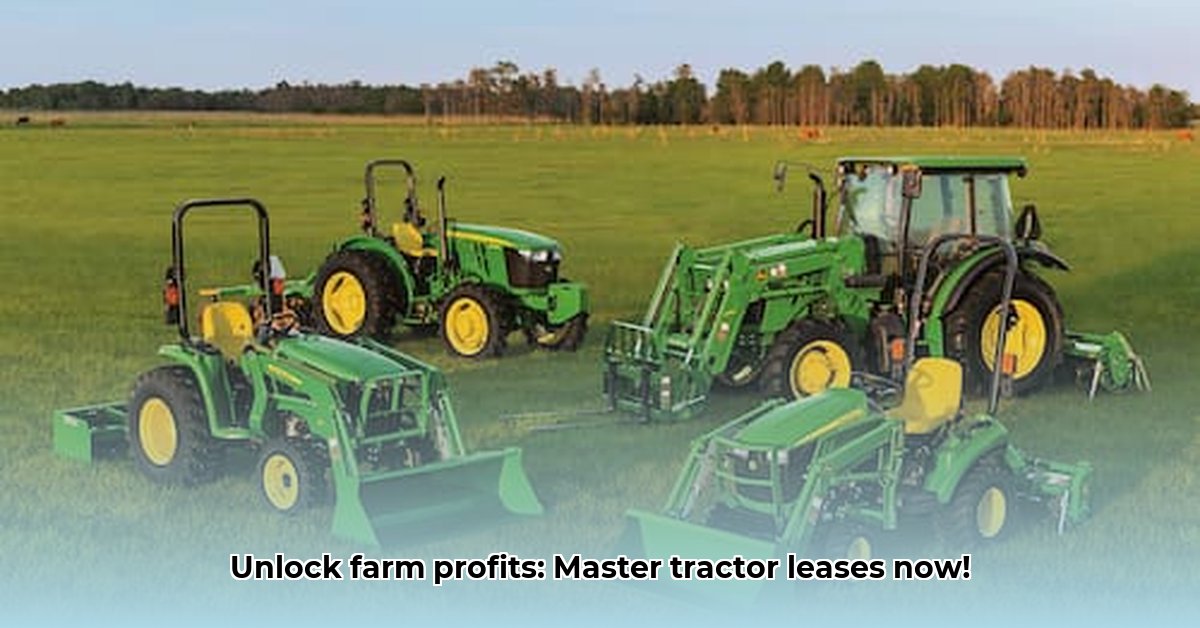
Tractor Leases: Your Path to Profitable Farming
Finding the right tractor is crucial for farm success, but purchasing one outright represents a significant investment. Tractor leasing offers a viable alternative, allowing farmers to access necessary equipment without substantial upfront costs. This guide delves into the intricacies of tractor leasing, equipping you with the knowledge to make informed decisions and optimize your farm's financial health. Are you ready to leverage leasing to boost your bottom line? For more detailed cost information, check out this helpful resource on tractor lease costs.
Understanding Tractor Lease Options: Rent vs. Buy (Sort Of)
Tractor leases function similarly to vehicle rentals, but for agricultural machinery. Primarily, two lease types exist: operating and capital leases. Operating leases resemble short-term rentals; you utilize the tractor for a defined period, paying monthly installments before returning it. Capital leases are akin to financing – payments are made over time, but ownership transfers only upon lease termination. The optimal choice hinges upon your farming operations and the intended tractor usage duration. Need a machine solely for harvest? An operating lease may suffice. Planning on long-term usage? A capital lease might be more suitable. Careful consideration of usage frequency and duration is vital for cost optimization. What type of lease best aligns with your foreseen needs?
The Real Cost of Tractor Leasing: Beyond Monthly Payments
Monthly payments represent only a portion of the total cost of tractor leasing. Maintenance responsibilities must be clarified; will you handle upkeep, or will the leasing company? Insurance coverage is another key aspect. Is it included in the lease agreement, or is separate insurance required? Hidden fees, such as early termination charges, are also potential cost factors. Meticulous review of the fine print is essential to avoid unexpected expenses. A comprehensive cost analysis covering the entire lease duration, perhaps aided by a spreadsheet, enables accurate budgeting and prevents financial strain. What unforeseen expenses might impact your lease budget?
The Legal Lowdown on Tractor Leases: Protecting Yourself
A tractor lease constitutes a legally binding contract, demanding careful attention to detail. Thorough contract review is paramount; don't hesitate to seek clarification on ambiguous aspects. If legal jargon proves overwhelming, consulting an agricultural lawyer specializing in equipment leases is advisable. They provide valuable guidance on your rights and responsibilities, helping to prevent future regret. This proactive approach to legal review can save considerable time and potential financial losses down the line. What legal safeguards should you prioritize when signing a tractor lease?
Weighing the Pros and Cons: Is Leasing Right for You?
Tractor leasing offers several advantages, but it isn't universally the best option. A balanced assessment of both benefits and drawbacks is crucial for informed decision-making.
| Pros | Cons |
|---|---|
| Lower upfront costs | No ownership at lease end |
| Tax benefits (Consult a tax professional) | Potentially higher overall costs |
| Flexibility: Easier upgrades | Limited customization options |
| Predictable monthly expenses | Dependence on leasing company for repairs |
Remember, these are general considerations; your specific experience might differ. A thorough evaluation of your farm's needs in relation to available options is recommended. Does the potential for higher overall costs outweigh the benefit of lower upfront payments?
Finding the Perfect Tractor Lease: Your Step-by-Step Guide
Securing the ideal tractor lease demands careful planning and due diligence.
Define Your Needs: Specify tractor size, essential features, and intended usage (e.g., plowing, planting, harvesting). Precision in requirements aids in locating the appropriate model.
Research Leasing Companies: Explore various leasing companies online. Compare prices, read reviews, and assess industry reputation. Avoid hasty decisions based on the first deal encountered.
Obtain Multiple Quotes: Contact several leasing companies for quotes. This allows for comparison of not only monthly payments but also contract terms. The lowest monthly payment doesn't always signify the best deal.
Meticulous Contract Review: Carefully examine the lease contract's fine print. Comprehend all aspects, including maintenance responsibilities, insurance requirements, and potential additional charges. Seek clarifications as needed.
Negotiate Terms: Don't hesitate to negotiate lease terms. A more favorable agreement than the initial offer might be attainable.
Formalize Agreement: Upon satisfaction with all terms, sign the lease agreement, ensuring complete and accurate documentation.
Making Tractor Leases Work for Your Farm
Tractor leasing can significantly enhance farm profitability, but careful planning and close attention to detail are essential. By thoroughly researching options, conducting a cost-benefit analysis, and following the steps outlined above, you can maximize the chances of a successful and financially rewarding leasing experience. Remember, the right tractor lease can propel your farm towards greater efficiency and profitability. What other factors should farmers consider when selecting a tractor lease?
Key Takeaways:
- Understanding the differences between operating and capital leases is crucial for selecting the most suitable option for your farm's needs.
- Meticulous cost analysis, including maintenance, insurance, and potential hidden fees, is vital for accurate budgeting and avoiding financial surprises.
- Thorough examination of the lease contract and seeking legal advice, if necessary, can safeguard your interests and prevent potential legal complications.
[1]: (This would contain a relevant URL if one were provided in the original draft article.)